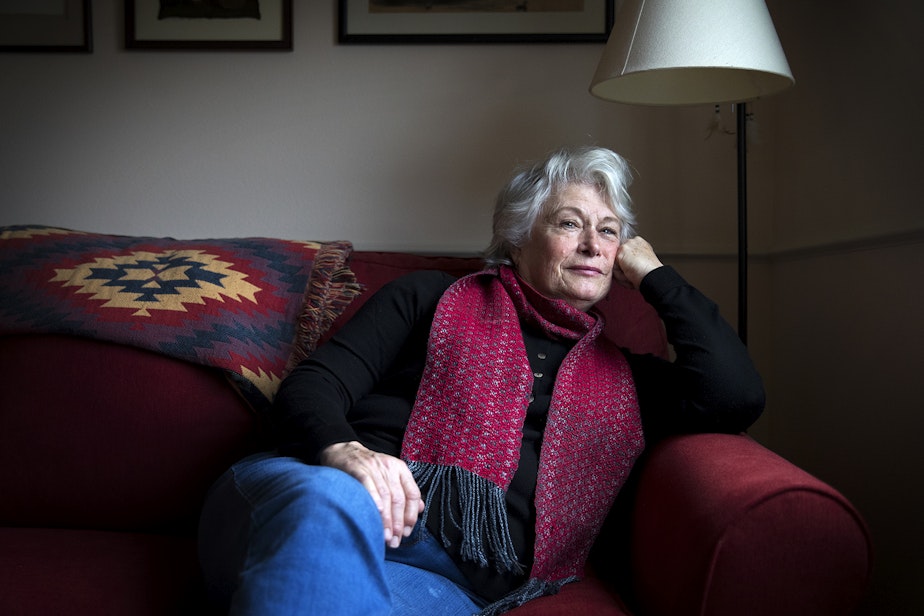As the pandemic grinds on, we could all learn a thing or two from this Seattle actor

When Suzy Hunt learned that state health officials had banned public gatherings, her first thoughts were for her friends in Seattle’s theater community. Everyone she knew immediately lost their jobs when performances were cancelled.
“There will be more jobs in the future,” Hunt says. “But right now, it’s so unkind.”
The social gathering restrictions have put more than 20,000 local cultural workers out of work since mid-March. Now they have to rethink life as they knew it in the days before Covid-19. They could all learn a thing or two from Suzy Hunt.
Hunt has been a professional actor for most of her life. She came to Seattle with her two young children in the late 1970s after a divorce, drawn by the city’s burgeoning theater scene. She worked at theaters around the city, and across the country, including a stint on Broadway.
By that time, her children were in college.
“I dropped them like hot rocks and moved to New York,” Hunt says. “They’ve forgiven me now, I think.”
Hunt made her living as an actor until she turned 70, when job offers started to dry up.
Sponsored
“I had a director, when I asked if I could audition, simply flat out say, ‘You’re too old, Suzy.’”
Now, with theaters across the country shuttered, and no idea when they’ll reopen, Hunt is less concerned about work for herself than she is the future of live performance.
“It has been a time of introspection for everybody, artists included, about 'how do I go forward, knowing what I know now?'”
Before coronavirus, Hunt still worked sporadically, but she’s learned to fill her time with other interests—gardening, cooking, and spending time with her children and grandchildren who live nearby in West Seattle. She has yet to hold her new grandson, born in late March.
“My son texted me the other day,” Hunt says with a laugh. “He wrote, ‘Mom, I love my new son, I love him, I love him, but I can’t wait to hand him off to you!”
Sponsored
Connections with family and friends are always important, but scientists say during the pandemic, they play a critical role in maintaining physical and mental health, especially brain health.
University of Washington neuropsychologist Kristoffer Rhoads says with our brains, it’s kind of a “use it or lose it” situation.
“One of the things we try to encourage people to do as they age is avoid cognitive retirement,” Rhoads says.
Studies show that when you stop challenging yourself, stop engaging with the world, you actually lose brain cells. Rhoads works with seniors, but now that so many Americans are out of work, they’re also at risk of long-term depression. That, in turn, actually can take years off your life.
Tatiana Sadak, an associate professor of nursing at the University of Washington, says something as simple as regular conversations with other people are as important to your health as getting enough sleep, exercising, and eating a balanced diet. She cites new research that finds a strong correlation between our emotional well- being and our physical health.
Sponsored
“When we have a lot of negative emotions, especially depression,” Sadak says, “we increase our levels of cortisol.”
That hormone is responsible for a number of processes in our bodies, including immune and stress response. High cortisol levels can do everything from disrupt sleep cycles to increase our blood pressure.
Sadak recommends keeping your body moving and your mind active; something as simple as laughing at yourself in the mirror or meditating can help de-stress you, at least temporarily.
Suzy Hunt has kept herself busy these past few months. She gardens, watches the birds at the feeder on her small patio, and takes regular walks.
“I get very claustrophobic, even in my own house,” Hunt says. “It’s so clean right now; I don’t think it’s ever been this clean!”
Sponsored
And Hunt finds ongoing comfort in her first love, theater. But like all of us, she consumes it online, pandemic style.
Sponsored
“Thank God, thank God for it,” she says.
It’s not the same as being onstage herself, or even sitting in the audience at a live performance. But like all of us in the age of coronavirus, Hunt takes her pleasures where she finds them.




